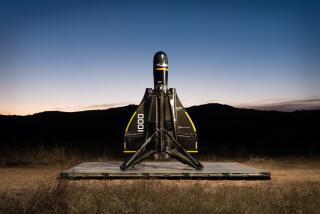AeroVironment posts 13% profit increase in its fourth quarter
- Share via
AeroVironment Inc., the Monrovia company that makes small hand-held drones and charging systems for electric vehicles, posted a 13% profit gain in its fourth quarter bolstered by an increase in sales.
Earnings for the quarter that ended April 30 rose to $17.6 million, or 79 cents a share, from $15.6 million, or 71 cents, a year earlier. Analysts on average had forecast a profit of 69 cents.
The results were reported after the close of regular trading. AeroVironment shares closed at $28.61, down 1 cent. In after-hours trading, they were up as much as 10% at $31.09.
AeroVironment is the Pentagon’s top supplier of small drones, which include the Raven, Wasp and Puma models. The technology enables troops on the ground to see what lies over a hill or down the road. The company also makes charging systems for electric vehicles.
But drone sales dropped 1.2% in the fourth quarter to $91 million, from $92.1 million a year earlier.
Total revenue for the quarter was $106.1 million, up nearly 7% from $99.4 million a year earlier. The jump was attributed to a 107% rise in electric charging system sales to $15.1 million.
“Our charging solutions are used today in homes, at businesses and in the public,” said AeroVironment Chief Executive Timothy E. Conver in a conference call, noting that the company rolled out its residential charging stations for the Nissan Leaf this year. “We’re very actively engaged in product development and business development and execution on the existing contracts as well as developing and expanding our capacity.”
For the full year, the company posted $292.5 million in sales with earnings of $1.17 a share.
Looking ahead to fiscal 2012, Conver said the company forecasts earnings of $1.28 to $1.35 a share on sales of $321 million to $336 million. That exceeds analysts’ predictions of $1.25 earnings per share on revenue of $320 million.
AeroVironment has been developing a high-endurance spy drone, dubbed the Global Observer, which is designed to fly at 65,000 feet for a week at a time. The plane, much larger than the hand-launched planes the company is known for, crashed at Edwards Air Force Base on April 1.
“After about 18 hours of flying, the plane was at about 30,000 feet above sea level when the mishap occurred before dawn,” he said. “We will not be able to say more about the mishap until the Air Force completes their review.”
AeroVironment sees the Global Observer opening new business markets for it and is building a second drone for test flight.
Conver said the company is “working on multiple fronts simultaneously to capture new business opportunities and to execute at a very high level on those opportunities.”
More to Read
Inside the business of entertainment
The Wide Shot brings you news, analysis and insights on everything from streaming wars to production — and what it all means for the future.
You may occasionally receive promotional content from the Los Angeles Times.










